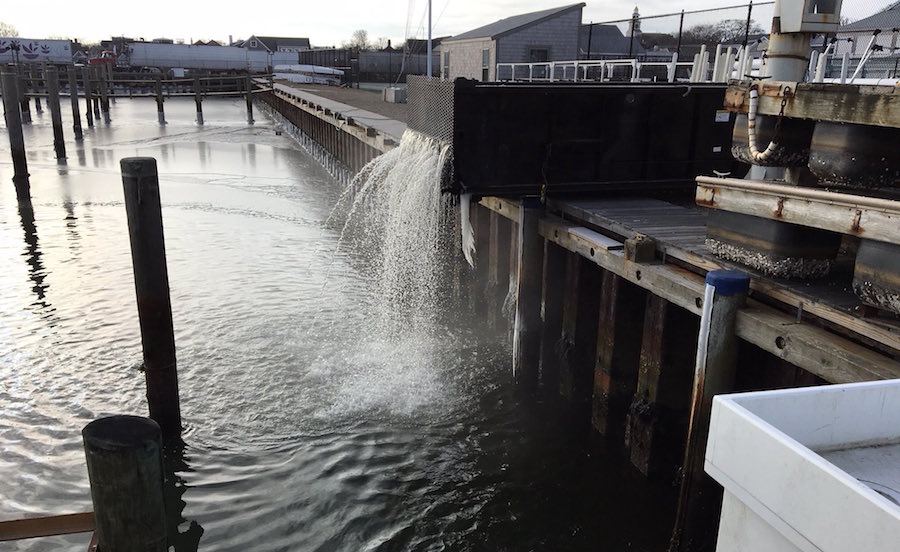Frigid temperatures over the weekend pressed construction crews across Massachusetts into action as they rushed to repair busted water and sewage lines after last week's “bomb cyclone” snowstorm.
On Jan. 4 a mega storm pummeled Boston and the region with heavy snowfall, and damaging winds that resulted in power outages and coastal flooding. Warming temperatures this week will help prevent further pipe breaks and accelerate the repair progress. But more flooding is expected as temperatures climbed to 33 degrees Monday afternoon and were expected to hit the 50s by Friday.
Perhaps the most dramatic construction remediation effort came after a sewer line failure in Nantucket flushed an estimated 2.5 million gallons of discharge into the Nantucket Harbor, a percentage of which was raw sewage.
The Massachusetts Air National Guard air lifted workers from Harwich, Mass.-based contractor Robert B. Our Co. Inc. via Blackhawk helicopter to the island after the 20-inch-dia. line broke during the storm. An employee from the engineering firm Hazen and Sawyer was already on the island during the storm working on a pump station upgrade.
“They were onsite with us immediately,” Jeff Carlson, the town’s natural resources coordinator, says of Hazen and Sawyer. “That was the one piece of luck we had.”
Over the weekend crews were able to mitigate the amount of raw sewage that flowed through the line’s three discharge points into the harbor. The team converged those three points into a single discharge point with a filter to collect solids in the wastewater flow. The crew installed a bypass line to tie into a “separate force main that runs in opposite direction but does sewage treatment,” Carlson said on Monday morning. “Currently they are working on getting that line up and running at capacity.”
Carlson said it will take a week to 10 days to conduct a forensic report on the damaged sewer line and the structural conditions of the street above the line.
Further exposing the state of the state's aging infrastructure, a pipe break in downtown Boston impacted the Monday morning commute a day after record-low temperatures plunged the region into a deep freeze.
The Boston Water and Sewer Commission tweeted that Monday morning's flooding near Boston City Hall, which was caused by a busted feed line for fire hydrants, was controlled by 8 a.m. and the streets and sidewalk in the area were reopen by 9 a.m. “Crews will remain on scene for repairs,” BWSC tweeted. “Water service should not be affected.”
The night before Boston tied record-low temperature of minus 2 set in 1896 on Sunday, Boston Medical Center also endured flooding after a frozen pipe exploded on Saturday night. Several floors were closed at the hospital, including the Neonatal Intensive Care Unit and Labor and Delivery floors, and 15 patients were move to other areas of the hospital.
“Six expecting mothers were transferred to nearby hospitals as a precaution,” according to a statement from hospital officials.
Chris Besse, a spokesman for the Massachusetts Emergency Management Agency, said the agency will be working with cities and towns during the next three to five weeks to determine a dollar value for the public infrastructure that was damaged during and after the storm. He said the figure will help determine if the state is eligible for assistance from the Federal Emergency Management Agency.
In a statement, MEMA said it "will initiate an Initial Damage Assessment process this week to estimate costs of emergency response and damage to public infrastructure for the January 4th storm, starting with the more than 70 coastal communities. The Initial Damage Assessment process will enable MEMA to assess the likelihood of qualifying for federal disaster financial assistance.”





